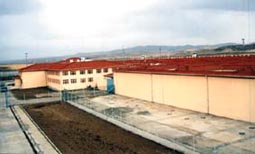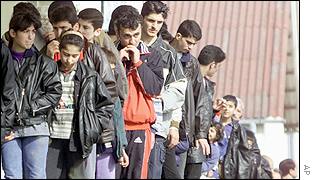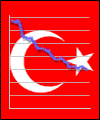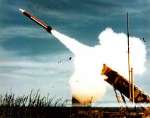16
July 2001
![]()
2. "Hunger-striker dies, 21 others paroled in Turkey", a 47-year-old inmate paroled in June due to failing health died Saturday after continuing her hunger strike against prison reforms, the Turkish Human Rights Association (IHD) said.
3. "Germany deports Kurdish refugees en-masse", in accordance with a decision taken by the State Interior Minister for Nordrhein Westphalen in Germany, which is run by the Social Democrat Party (SPD), 80 pro-Kurdistan Workers Party (PKK) Kurdish refugees were deported to Turkey on Jul. 3. The Kurds were taken to Turkey accompanied by 56 German police officers.
4. "Turkey's economic crisis is a piece of social dynamite", there are limits to the people's capacity for suffering.
5. "Turkish and Israeli missiles near Turkish- Syrian border", the Paris - based al-Muharrir news weekly issued on Friday quoted a high ranking source at the Kurdistani national federation party led by Jalal al-Talibani from Paris as saying that several intermediate and long range ground- to ground missiles launching bases on the Turkish- Syrian borders have been installed, expecting the eruption of a limited war between Syria and Isreal and its sparks starting from South Lebanon.
6. "Operation started in Catak", the Turkish military has begun a broad operation in the rural region of the Catak district of Van. Military units tied to the Van and Catak Regiment Command began an operation in the area of Kato and Ciyayespi Mountains upon the assertion that 400 guerrillas from the People's Defense Forces had entered the region.
1. - AFP - "Turkey gives up plans for controversial new prisons":
ISTANBUL
Turkey announced Sunday it will not build more of the controversial
F-type prisons that triggered a wave of hunger strikes in which 29 protestors
have died once the current programme is completed. "From now on,
not a single F-type prison will be built anywhere in Turkey," Justice
Minister Hikmet Sami Turk said, quoted by Anatolia news agency. Meanwhile,
Istanbul police detained 42 people protesting against the new prisons
outside the justice ministry.
According to the Turkish Human Rights Association (IHD), Turkey had planned to build 11 F-type prisons, with four already in operation and one ready to be opened. The other six are expected to be completed in the next few months. The hunger-strike protest movement was launched last October by hundreds of left-wing inmates who oppose the new jails where cells holding a maximum of three people replace large dormitories for up to 60. The prisoners and human rights activists claimed confinement in smaller units alienated inmates from fellow prisoners and left them more vulnerable to ill-treatment and torture by prison officials. Ankara held that packed dormitories were the main factor behind frequent riots and hostage-taking incidents in its unruly jails.
On Saturday, the hunger strike claimed its 29th life with the death of a 47-year-old inmate who had been paroled in June due to failing health. The dead woman, Sevgi Erdogan, was one of some 20 inmates conditionally released from prison in June who continued their hunger strike in a house on the outskirts of Istanbul, the Turkish Human Rights Association (IHD) said. According to Turkey's Human Rights Foundation, another 180 inmates are still on hunger strike and about 50 have been released from jail over the past few weeks because of their deteriorating state of health. Last month, European Greens deputy Daniel Cohn-Bendit, co-chairman of the Europe-Turkey committee, toured Turkey's prisons and afterwards appealed to the hunger-strikers to call off their action. He said the new jails did not justify their fast to death. But at the same time, Cohn-Bendit called on Ankara to open a dialogue and to further ease jail conditions. Ankara has modified some of the isolation conditions, allowing prisoners joint recreational facilities, but these moves have failed to satisfy either the strikers or the civic groups backing their demands.
The dramatic protest put Turkey's bleak human rights record
in the spotlight at a time when the country is trying to carry out democratic
reforms so it can join the European Union. The deaths from fasting followed
a controversial security operation against the strikers in December,
which left 30 prisoners and two soldiers dead in 20 jails across the
country. The operation, intended to break the strike, has recently come
under question, with official pathologists' reports contradicting the
government's account of how many deaths occurred. ![]()
2. - AFP - "Hunger-striker dies, 21 others paroled in Turkey":
ISTANBUL
A 47-year-old inmate paroled in June due to failing health died
Saturday after continuing her hunger strike against prison reforms,
the Turkish Human Rights Association (IHD) said. Sevgi Erdogan was one
of some 20 inmates conditionally released from prison in June who continued
their hunger strike in a house on the outskirts of Istanbul, the IHD
said.
Earlier Saturday, Turkish news media reported that another 21 inmates had been released to their families overnight on a six-month parole because their health had deteriorated. A total of 45 inmates have been conditionally released for six months since June 29 because of concerns over their health, Anatolia news agency quoted Justice Minister Hikmet Sami Turk as saying. Erdogan was the 29th hunger-striker to die since the movement was launched last October by hundreds of left-wing inmates who oppose new jails where cells holding a maximum of three people replace large dormitories for up to 60.
A further 30 prisoners died last December when authorities raided some 20 prisons in a bid to break the strike movement. Two policemen were also killed. The prisoners and human rights activists claim confinement in smaller units would alienate inmates from fellow prisoners and leave them more vulnerable to ill-treatment and torture by prison officials. Ankara has rejected any dialogue and insists that packed dormitories are the main factor behind frequent riots and hostage-taking incidents in its unruly jails.
But it has modified some of the isolation conditions,
allowing prisoners joint recreational facilities. However, these moves
have failed to satisfy either the strikers or civic groups backing their
demands. ![]()
3. - Turkish Daily News - "Germany deports Kurdish
refugees en-masse":
In accordance with a decision taken by the State Interior Minister for
Nordrhein Westphalen in Germany, which is run by the Social Democrat
Party (SPD), 80 pro-Kurdistan Workers Party (PKK) Kurdish refugees were deported to Turkey on Jul. 3. The Kurds
were taken to Turkey accompanied by 56 German police officers. The NRW
Interior Ministry chartered a special plane to send the Kurdish refugees
back to Turkey. They were met by Turkish intelligence and police at
Ataturk International Airport and immediately taken into custody, where
they underwent identity checks and gave statements. While 25 were arrested
for political activities, the remainder were released. According to
news in Ozgur Politika, known to be pro-PKK in its views, among those
deported were children, the old and infirm.
(PKK) Kurdish refugees were deported to Turkey on Jul. 3. The Kurds
were taken to Turkey accompanied by 56 German police officers. The NRW
Interior Ministry chartered a special plane to send the Kurdish refugees
back to Turkey. They were met by Turkish intelligence and police at
Ataturk International Airport and immediately taken into custody, where
they underwent identity checks and gave statements. While 25 were arrested
for political activities, the remainder were released. According to
news in Ozgur Politika, known to be pro-PKK in its views, among those
deported were children, the old and infirm.
Human rights groups uneasy
The newspaper also cites statements by the Pro-Asyl and Fluchtlingsrat human rights organizations that say thousands of Kurds have been deported to Turkey over the past two years and that they have little information regarding the latest to be deported. The organizations say they have been able to ascertain that only 35 Kurds have been tortured by Turkish police.
IHD not informed
Istanbul branch officials of the Human Rights Association (IHD), that gives information to the newspaper, have confirmed the deportation incident. IHD officials said they spoke with their lawyers at the airport police station and confirmed the incident had occurred. They said they could get detailed information as definite names had not been given.
Romania also on the alert
Meanwhile, the Romanian government has moved into action
after seeing the true face of the PKK and becoming disturbed by the
actions of its sister organizations in Romania. Romanian police raided
the Kurdish Cultural Association, the Orient Businessmen's Foundation,
the Voice of Mesopotamia newspaper and the Med Tradesmen's Union in
Bucharest on Jul. 10. ![]()
4. - Frankfurter Rundschau - "Turkey's economic crisis is a piece of social dynamite":
There are limits to the people's capacity for suffering
ATHENS / by Gerd Hoehler 
Several million Turks came to enjoy higher earnings from July 1.
The state increased the monthly minimum wage by five per cent. It is
now 107.3 million Turkish lira - less than 100 US dollars.
The minimum wage in Turkey is not only a statistical figure.
Millions of workers actually have to live on it. The fact that they have now been given a five-per-cent raise must seem like a piece of barefaced cheek to them.
Since the start of the country's financial crisis at the end of February, not only has the national currency unit shed nearly 50 per cent of its external value, inflation has risen steeply too. Annual inflation stood at 56.1 per cent in June. A further increase in the minimum wage is supposed to take place on August 1 but this will not even come close to offsetting inflation.
Are people able to survive on 107 million lira a month? A reality show on private TV channel Kanal D promises to answer this. Two candidates, 19-year-old Hasan Maciomanoglu and 21-year-old Eda Caki, will attempt to live on the minimum wage for a month. They are not allowed to use credit cards or to work up debts. Viewers will be able to watch how their cash keeps shrinking daily. A cash prize of 25 billion lira (nearly 19,000 dollars) and a car await the winner.
However, the reality show is not exactly true to life. The candidates will be living in deluxe apartments in Istanbul throughout the four-week experiment. Rent for the apartments alone would swallow ten times the minimum wage. "Under normal conditions and over a longer period, nobody would be able to survive," a spokesman for the trade union federation Turk Is says.
But, not only the millions-strong army of minimum-wage earners, even many middle-class Turks are encountering hard times on account of inflation. Teachers, for instance, earn about 250 million lira (185 dollars) a month. A single person can live on this - if he or she restricts himself and does not have to pay rent - but it is not enough to maintain a family. Therefore, many Turks are trying to moonlight at two or three side-jobs in order to keep their heads above water. Such jobs are only difficult to find since the crisis propelled thousands of companies into bankruptcy and led to the loss of at least 500,000 jobs.
After initial mass protests, the people are bearing their misery with stoical humility. The Turkish capacity for suffering might be high but it is not endless. Concern that the limit might be reached soon seems to be moving the Turkish military also. The National Security Council, a state organ dominated by top-ranking generals, presented a secret expertise at a recent meeting, newspapers in Istanbul reported. The document warns that the ongoing impoverishment of large sections of the population would lead to a "social explosion", the papers said.
The Istanbul police report that the incidence of street robberies has increased tenfold over the past three months. On the other hand, the upper crust of the society seems to be unscathed by the crisis.
Those - like former central bank governor Gazi Ercel - who were clever enough to change their lira into foreign currency, made a fortune.
The luxury restaurants in which you can spend a monthly
minimum wage on a meal almost without blinking, are as well-patronised
as they ever were. Only, sometimes uninvited guests spoil the appetites
of the gourmets with tasteless chanting. For instance, recently as demonstrators
turned up in front of the restaurant Laila, a favourite haunt of celebrities,
shouting: "Here are the plunderers. Where are the plundered?"
Protest has remained peaceful - up to now![]()
5. - Arabic News - "Turkish and Israeli missiles near Turkish- Syrian border":
The Paris - based al-Muharrir news weekly issued on Friday
quoted a high ranking source at the Kurdistani national federation party
led by Jalal al-Talibani from Paris as saying that several intermediate
and long range ground- to ground missiles launching bases on the Turkish-
Syrian borders have been installed, expecting the eruption of a limited
war between Syria and Isreal and its sparks starting from South Lebanon.

The Kurdish source added that tens of Israeli military men are taking
part with hundreds of Turkish military men supervision of these bases
that many of them can be seen from inside the Turkish territories near
the Iraqi, Turkish and Syrian border triangle.
He added that his party received information saying that the number of Israeli and Turkish batteries deployed in that area exceeds 20. Most of them gathered in the central and coastal area separating between Syria and Turkey.
Moreover, information by certain western circles in Ankara
reported that Jewish establishments and individuals are buying lands
of the current border areas between Syria and Turkey and the objective
behind these buying operation is still unclear. ![]()
6. - Kurdish Observer - "Operation started in Catak":
The Turkish military has begun a broad operation in the rural region of the Catak district of Van. Military units tied to the Van and Catak Regiment Command began an operation in the area of Kato and Ciyayespi Mountains upon the assertion that 400 guerrillas from the People's Defense Forces had entered the region.
MUSTAFA KAYA 
It was learned that about 5,000 soldiers and guards from the Catak
region are participating in the operation. It was reported that war
planes and Cobra helicopters have begun search flights in the region
and that the operation is still in the reconnaissance phase.
Local sources say that rumors that guerrillas have entered
the region are false and that, just the contrary, village guards (militiamen)
in the region are constantly giving the military wrong information concerning
order in the region because they are afraid of losing their positions.
![]()